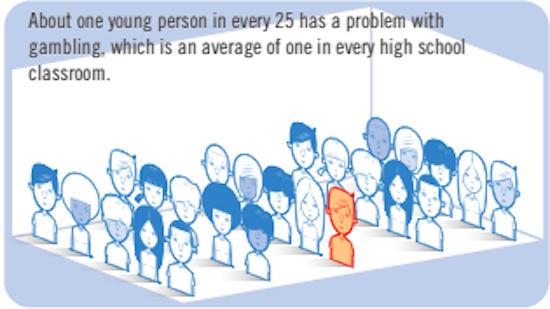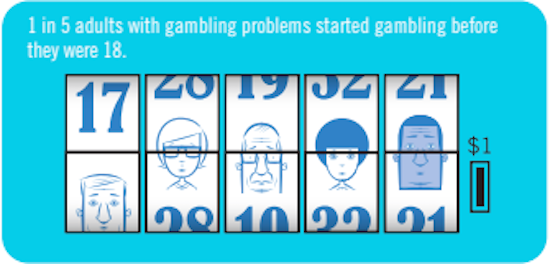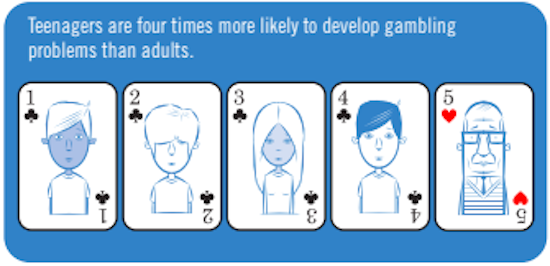You might think gambling isn’t a kid’s problem, but most children have gambled in some way by the age of 15. Gambling is illegal for young people but is becoming increasingly common. This is why it should become a normal conversation to have early, like talks of drinking, drugs and sex.
The problem
A 2020 NSW survey found that 30% of young people aged 12-17 gambled over the last year, and their introduction to gambling began at age 11 or 12. Despite its illegality, a 2018 report by Growing Up In Australia found that one in six adolescents aged 16-17 reported some form of gambling.

There are several risks linked with excessive gambling. These include:
- The inability to pay for essential items, by gambling away possessions and funds
- Depression or suicidal thoughts
- An increased likelihood to engage in criminal activity and violence
- Problems within the family, including arguments, violence, neglect and poor relationships

Types of gambling
Gambling may begin in childhood with games at home, buying lottery tickets or scratch cards, and in adolescence betting on races or sports. The use of video game gambling is increasing, with excessive video gaming recognised as a growing health concern.
With the options available in the online world, spending money on virtual goods is becoming more common. The Victorian Responsible Gambling Foundation found in 2017 that 34% of Australian young people made in-game purchases for online games.
Loot box features are becoming more common, where random rewards can be purchased with real money, a sort of lottery to increase playing incentives. Social casino games are often engaged with as an introduction to the world of gambling. A 2016 study found that 54% of Facebook games had gambling content, and 22% alluded to slot machines, showing the need for education on the risks of gambling.

Risk and protective factors
Children are more susceptible to gambling problems due to developmental and cognitive immaturities combined with peer pressure. Some common risk factors associated with higher likelihood of engaging in gambling include:
- Alcohol use
- Depression
- Smoking
- Drug use
- Impulsivity
- Violence
- Temperaments
- Anti-social behaviour
- Poor academic performance
- Mental health disorders
A 2018 report by the Victorian Responsible Gambling Foundation recognised protective factors that could limit a child’s exposure to gambling problems. These include:
- No substance abuse
- Low impulsivity
- High self-esteem
- Low risk-taking
- Future-oriented thinking
- The ability to regulate emotions

Preventing the problem before it begins
Gambling should be a topic of conversations when children are young enough to understand the implications of betting and using real money. It can become a problem early in adolescence, carrying into adulthood. There are recognised ways to prevent gambling becoming a problem which mostly involve open communication and limiting screen activity.

Explain how gambling works
Children in primary school will generally be ready to learn about gambling. Talk to them about the likelihood of winning compared to other chances. The likelihood of winning the jackpot for Powerball is around 1 in 290 million. However, the chance of finding a four-leaf clover is 1 in every 10,000! They should know that gambling your own money is something to be taken seriously, but having fun is also okay. Encourage sharing your betting activities, so habits that can get out of control are not hidden.
Ensure your family attitudes and activities are a reflection of your stance
Your family’s attitude to gambling can influence your child. The less they are exposed, the less likely they could develop a problem. If you gamble regularly, your child might see this as normal behaviour and want to copy. Gambling language, such as ‘I bet you can’t shoot three baskets in a row, if you do we can go for ice-cream’ can be used to encourage children. There is a fine line between healthy gambling messages and unhealthy habits.
Set limits for screen use and online gambling
Allowing your children to play online video games with gambling content can lead to addictive habits and make them want to play until they keep winning. Do not connect your credit card to gambling-type games, and ensure your children know life is not always about winning. Supporting positive mental health by promoting non-digital interests is important.

Look out for warning signs
If your child is struggling at school or with friends, they might be more susceptible to develop a gambling problem as an escape. Be on the lookout for these problems, such as focusing on sports odds rather than the sport itself, or changes in the amount of money your child has. Encourage more positive extracurricular activities than betting or gambling games. Ask them what games they play and remember to talk to them about how real-life betting works.

Compulsive gambling is a recognised addiction that is treatable, but easier to prevent. It is becoming increasingly common in children and adolescents, so it is important to recognise gambling behaviours to prevent betting from becoming a bigger problem. If you know or suspect anyone to be struggling with gambling behaviours, seek help at Gambler’s Help on 1800 858 858.



